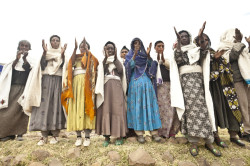
Source - La Via Campesina
September 2, 2014
Via Campesina Africa, WoMin and Rural Women’s Assembly (RWA) Press Release
(Bulawayo, Zimbabwe, August 18, 2014) – Women and Mining (WoMin), Via Campesina Africa and Rural Women’s Assembly (RWA) contributed to demands made to the SADC Head of States during the just ended SADC People’s Summit held in Bulawayo, Zimbabwe from the 15th to the 16th of August 2014.
The RWA, WoMin and Via Campesina delegates were part of the more than 2,500 delegates drawn from grassroots movements, community and faith-based organizations, women’s organizations, labor, student, youth, economic justice and human rights networks and other social movements.
The Peoples’ Summit was convened under the leadership of the Southern Africa People’s Solidarity Network (SAPSN) and Peoples Dialogue at the Zimbabwe International Trade Fair grounds in Bulawayo, Zimbabwe under the theme ‘Reclaiming SADC for People’s Development-SADC Resources for SADC People’. This political position responds to our shared analysis that the SADC development agenda is increasingly determined by corporate interests, which are privileged above the region’s 260 million people.
Via Campesina and RWA met under the agriculture and food sovereignty cluster while WoMin met under the extractives and climate cluster, and developed their own statements, which were included in the communiqué submitted to the Heads of States.
The Mozambique Union of Farmers, member of La Via Campesina, met to speak about Pro-Savanna’s role in land grabbing in Mozambique and asked for regional solidarity.
“Rural women in Africa are the main producers of food, yet their contribution remains invisible. They are the most marginalized in terms of access to land and secure tenure, natural resources, and political rights. Patriarchal relationships continue to prevail, making rural women vulnerable and subject to violence” read part of the RWA declaration.
The communiqué went on to demand that governments fulfil their commitment to allocate 10% of national budgets to agriculture following the Maputo declaration at African Union level. RWA and Via Campesina also demanded that governments include small-scale farmers in policy and decision making processes. Other demands included women’s rights to land and security of tenure and protection of organic products, indigenous seeds and knowledge to ensure food and seed sovereignty.
WoMin’s commission observed that the extractives industries have resulted in land dispossessions and degradation, water grabs, water and air pollution and also create deep social problems through displacements, increased HIV/AIDS levels, teenage pregnancies and hunger. Women carry the greatest burden of impact because of an unequal gender division of labour. The Commission demanded the overhaul of the legal system governing mining, labour and the environment to protect communities; safeguard land, air and eco-systems; and ensure that polluting corporates are held accountable.
Given the close relationship between fossil-fuel based energy systems, extractives and climate change, the Commission argued that a transition to renewable energy is critical to improve people’s lives and safeguard the planet. Finally, this destructive model of extractivist development must be challenged from below – by affected communities and women in particular. A new people-centred development approach and supporting laws and policies is needed which promotes human well-being above profits.
In another commission organised by RWA and Forum Mulher focused on feminist movement building in SADC, participants agreed that women within SADC continue to suffer under patriarchy and discriminatory cultural practices. The majority of women are not free because they lack independent access to land, natural resources and finances, and spend many more hours than their male counterparts every day doing unpaid domestic and care work in their families and communities, work which is not recognized, valued or remunerated. In addition to the demands made above, women called for protection against gender-based violence, and for an end to sex trafficking and sexual harassment.
This year’s summit coincided with the 2nd Anniversary of the Marikana Massacre in which 34 mineworkers, striking for a decent wage, were killed by the South African police. Members of the ruling party and the Lonmin Corporation were complicit in these murders. Michelle Pressend, working on a global campaign to dismantle corporate power, urged governments and peoples of the region to join hands and avoid the Marikana situation repeating itself in any other country. “We must stand and fight for justice in Marikana. The miners’ blood is crying for justice’ she added.
The Summit concluded with the traditional SADC Peoples´ march of more than 2000 delegates from the Zimbabwe International Trade Fair grounds to the City Hall to hand over their demands to representatives of the Zimbabwean government for submission to the SADC Heads of State meeting.
Contacts for more Information
Mercia Andrews, RWA – phone: +27823683429 – email: mercia@tcoe.org.za
Elizabeth Mpofu, La Via Campesina – phone: +263772443716 – email:elizabeth.mpofu@viacampesina.org
Samantha Hargreaves, WoMin (gender and the extractives industries) – phone: +27 83 384 0088 –email: samyhargreaves@gmail.com
Resources:
Visit WoMin’s website - https://womin.org.za/ - where you’ll find our research collection and over 240 references related to women, gender and extractivism
Visit Via Campesina website - https://viacampesina.org
